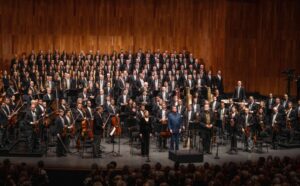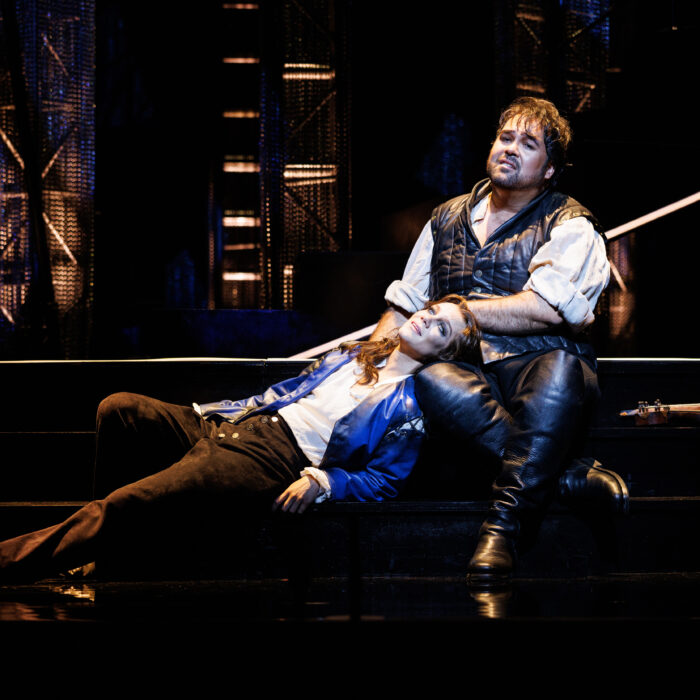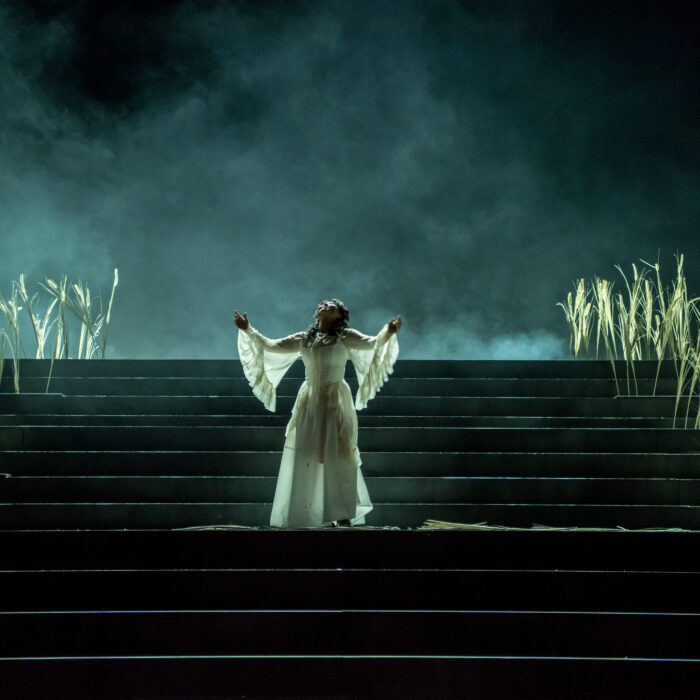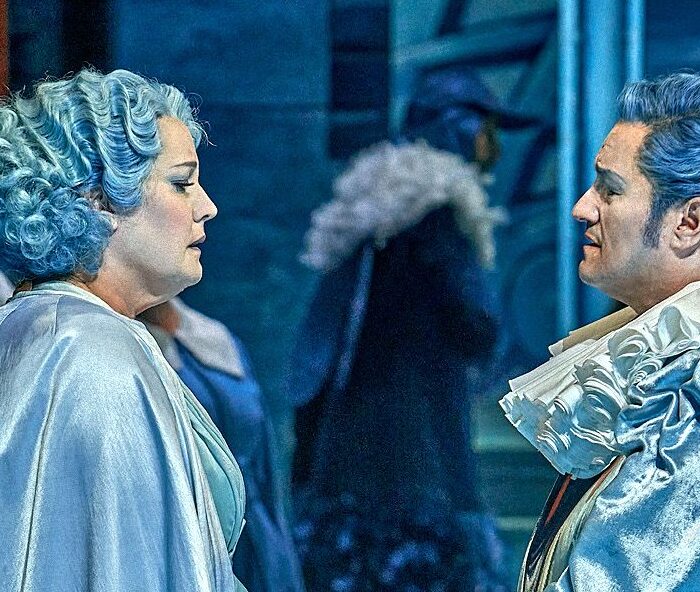
Salzburg Festival 2023 Review: Brahms Requiem
By João Marcos Copertino(Photo: © SF/Marco Borrelli)
If I had to define the Salzburg Festival in one word, it would be “tradition.” This has both good and bad implications. Revering tradition is an active attempt to make the past alive and present. The concertgoers sport their Dirndl and Lederhosen, traditional Tirol formal wear, with much pride, as they should. The claims of tradition, however, have also been used to justify the exclusion of women and people of color from classical music. The Vienna Philarmonic, under the flag of tradition, did not accept women until two decades ago. And tradition can also mean a stagnating repertoire. Salzburg is not the place where one goes searching for new music.
The Vienna Philharmonic Orchestra’s rendition of Johannes Brahms’ “German Requiem” englobes the full spectrum of what “tradition” signifies. One of the most emblematic pieces of the nineteenth-century repertoire performed by Austria’s most prestigious orchestra and Vienna’s Singverein. The music is great, and the mostly male orchestra is, too. But a listener sitting among the Dirndl and Lederhosen might wonder whether they do anything to interrupt the tradition of making Brahms a lullaby for the complacencies of nation and class.
Traditional & Energetic
Thankfully, conductor Christian Thielemann might be one of the few conductors, nowadays, who reads romantic symphonic music that is both “traditional” and energetic. Though never as austere in his movements as Richard Strauss or even Erich Kleiber, Thielemann does not make the podium a theater for histrionic gestures. Without a score, his tempi are as clear as his dynamics are smooth. There are no attempts made towards radical changes or a non-egoistic approach to the piece. The star is Brahms’s music.
Another of Thielemann’s merits is that of extracting a wide range of dynamics from the Vienna Philharmonic Orchestra (VPO) without letting them play deafeningly loud. The VPO is, by all accounts, one of the greatest orchestras in the world, but it has tended to play louder and louder, lately. A concert in Théâtre des Champs-Elysées last May may have injured the ears of most people sitting any closer than the first balcony. Even here in Salzburg they can, depending on the conductor, overdo their sound. However, Thielemann controls the game. The sounds are explosive only when they have to be, especially in Brahms’s version of “Dias Irae,” the Requiem’s sixth movement. Even the second movement, when the chorus sings “Denn alles Fleisch, es ist wie Gras” for a second time, the fortissimo was tasteful. It was an affirmation, not yelling.
Second Merit
A second merit is the Vienna Singverein prepared by Johannes Prinz. Because of its difficulty, the task of singing Brahms’ “Requiem” is often undertaken by a professional opera chorus. With all due respect to professional singers, there’s an instrumental difference between a professional opera chorus and an amateur or semi-professional symphonic chorus. While the former tends to sing everything beautifully and loudly, with fewer singers, their sonority can often sound like an intoned punch, albeit a pitch perfect one. This type of chorus is supposedly composed of prima donnas and almost Pavarottis.
The latter, however, is often composed of many more members, causing a visual impact hard to match. For this particular performance, there were more than a hundred singers on stage. An opera chorus can get by with less than half of this number. Their massive sound is no punch. It is a congressional voice, an entire well-rehearsed ecclesia. Their sound is more penitent and they only pierce the orchestral wall with the strength of many, not by the strength of their voices.
When they performed “Tod, wo ist dein Stächel?/Hölle, wo ist dein Sieg?” (“O Death, where is thy sting?/O Grave, where is thy victory?”), I thought of buying a German bible and converting to the Church. There was an impression that only living tradition can bring, a search for true beauty that comes from the transcending of life. This beauty that denies the material and the mundane in the name of a sound that aims for the beyond. It was truly a spectacular phenomenon.
Great Soloists
Soprano Elsa Dreisig seemed to share with the chorus similar feelings of penitence. In her chair while waiting for her solo, one could sense her immersion in the music. Her solo was extremely correct. She showed off her great qualities in vocal phrasing. Her high notes, though a bit more explosive than delicately sublime, appeased the audience’s spirits.
Baritone Michael Volle has a generous Wotanesque voice, nowadays. Although, sometimes he sounded a bit more Hangenish. In his third movement, “Herr, lehre doch mich” sounded a bit more like a pastor being led by its lamb. In his defense, however, the concert was at eleven o’clock in the morning. In the sixth movement, nevertheless, his contributions were inestimable. Fierce and smooth, he gave to Brahms a tenderness even in the most dure moments. In some ways, one could see how the “German Requiem” might have inspired Fauré’s.
By the end, the audience was ecstatic. In the final moments of the concert there was complete silence for more than a few seconds. This was thanks to Thielemann’s expressive hands, as he conducted batonless. After the silence, the audience’s hands must have bled from so much clapping. Even when the orchestra had left for home, two-thirds of the hall remained full of people standing tall, demanding another curtain call from the conductor and the two soloists. People tend to applaud more when the concerts are shorter. I wonder, could Brahms have been accompanied by another piece in the first half? Something new, maybe? I do not know. But, it is interesting how Brahms was, as all good traditions must be, kept alive. Even though it was a “Requiem.”
Categories
Reviews

